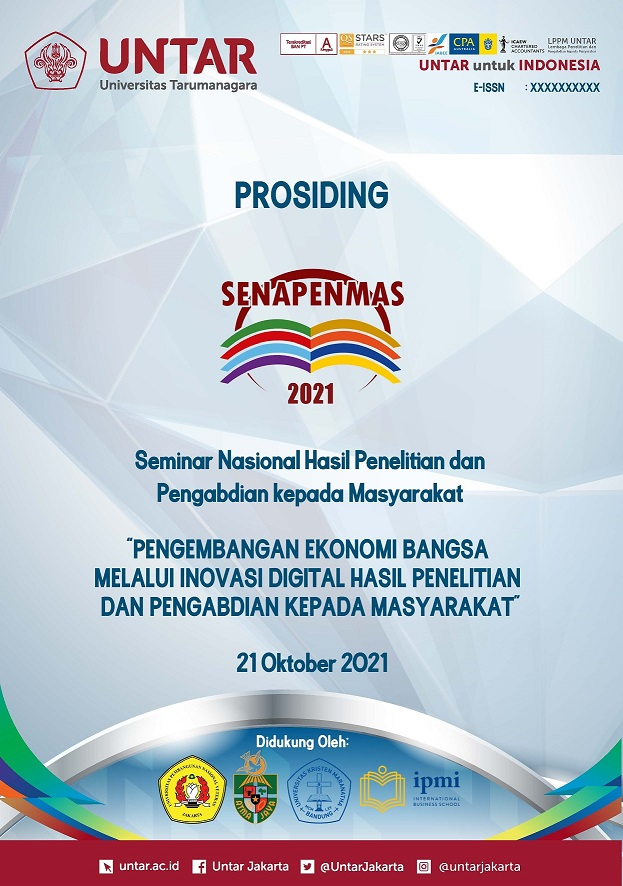PERSEPSI PELANGGAN TERHADAP MANFAAT KEGIATAN CREATING SHARED VALUE DAN KEBERLANJUTAN USAHA PT UNILEVER INDONESIA TBK
Main Article Content
Abstract
The company as an entity that does business in producing and selling its products to consumers, cannot be separated from the environment around the company. This is because the company will produce products that will be sold for the desired profitability and affect the surrounding environment, so the company is also required to creating shared value, which have an impact on the problem of business sustainability. The purpose of this study was to obtain empirical evidence of customer perceptions about the benefits of creating shared value activities and business sustainability of PT Unilever Indonesia Tbk on the products purchased. The population to be sampled is a randomly selected Unilever product customer in West Jakarta, who has the same chance of being selected as a sample. The research sample was 30 samples. Customers have responded well to the benefits of creating shared value for their own customers and have a positive impact on the company because it will benefit the sustainability of PT Unilever Indonesia Tbk. The result of the customer's perception of the benefits of creating shared value is a higher percentage of agree that the product is easy to find because it has a good logistics system and competitive advantage over Unilever's product innovations. The samples were taken only from West Jakarta, so the results cannot be generalized to all Unilever product customers in Indonesia. This research is expected to improve the company's reputation for the benefits of creating shared value activities and their impact on the business sustainability of PT Unilever Indonesia Tbk.
Perusahaan sebagai entitas yang melakukan bisnis dalam memproduksi dan menjual produknya terhadap konsumen, tidak terlepas dari lingkungan sekitar perusahaan berada. Hal ini dikarenakan perusahaan akan memproduksi produk yang akan dijual untuk profitabilitas yang diinginkan dan mempengaruhi lingkungan sekitar, maka perusahaan pun dituntut untuk melakukan creating shared value, yang berdampak pada masalah keberlanjutan usahanya. Tujuan dari penelitian ini adalah untuk memperoleh bukti empiris persepsi pelanggan tentang manfaat kegiatan creating shared value dan keberlanjutan usaha PT Unilever Indonesia Tbk terhadap produk yang dibeli. Populasi yang akan dijadikan sampel adalah pelanggan produk Unilever di Jakarta Barat yang dipilih secara acak, yang memiliki peluang yang sama untuk dipilih menjadi sampel. Sampel penelitian sebanyak 30 sampel. Pelanggan telah merespon dengan baik manfaat kegiatan creating shared value bagi pelanggannya sendiri serta berdampak positif bagi perusahaan karena akan bermanfaat bagi keberlanjutan PT Unilever Indonesia Tbk. Hasil dari persepsi pelanggan terhadap manfaat kegiatan creating shared value lebih tinggi persentase setujunya terletak pada produk yang mudah dicari karena memiliki sistem logistik yang baik dan keunggulan kompetitif atas inovasi produk Unilever. Sampel yang diambil hanya dari Jakarta Barat, sehingga hasilnya tidak bisa dijadikan generalisasi untuk semua pelanggan produk Unilever di Indonesia. Penelitian ini diharapkan dapat meningkatkan reputasi perusahaan atas manfaat kegiatan creating shared value dan dampaknya terhadap keberlanjutan usaha PT Unilever Indonesia Tbk.
Article Details
References
Fineman, S. (1996). Emotional Subtexts in Corporate Greening. Organization Studies, 17(3), 478-500.
Ghozali, I. (2012). Aplikasi Analisis Multivariate dengan Program IBM SPSS 20. Edisi 5. Semarang: Badan Penerbit Universitas Diponegoro.
Gunawan, J. (2015). Buku Panduan Laporan Berkelanjutan: Prinsip Menentukan Isi dan Kualitas. Jakarta: Mitra Wacana Media.
Kotler, P. & Gary, A. (2008). Principles of Marketing. Twelfth Edition. Prentice Hall.
Livesey, S. (1999). McDonald’s and the Environmental Defence Fund: A Case Study of a Green Alliance. The Journal of Business Communication, 36(1), 5-39.
Livesey, S. (2001). Eco-identity as Discursive Struggle: Royal Dutch/Shell, Brent Spar, and Nigeria. The Journal of Business Communication, 38(1), 58-91.
Meek, G. K. & Gray, S. J. (1988). The Value Added Statement: An Innovation for The US Companies. Accounting Horizons, 12 (2), 73-81.
Porter, M. & Mark, R. K. (2011). Creating Shared Value: How to Reinvent Capitalism-and Unleash a Wave of Innovation and Growth. Harvard Business Review, Jan/Feb, 63-70.
Remiasa, M. & Lukman, Y. (2007). Analisis Persepsi Pelanggan Terhadap Kualitas Layanan Coffee Shop Asing dan Coffee Shop Lokal. Jurnal Manajemen Perhotelan, 3(2), 70-79.
Sekaran, U. (2003). Research Methods for Business. Fourth Edition. John Wiley & Sons, Inc.
Spitzeck, H & Sonia, C. (2012). Creating Shared Value as a Differentiation Strategy – The Example of BASF in Brazil. Corporate Governance, 12(4), 499-513.
Thio, S. Harianto, N. Y. S. & Sosiawan, R. F. (2008). Persepsi Konsumen Terhadap Makanan Organik di Surabaya. Jurnal Manajemen Perhotelan, 4(1), 18-27.
Tregidga, H. Milne, M. & Kearins, K. (2014). (Re)presenting ‘Sustainable Organizations’. Accounting, Organizations and Society, 39, 477-494.


